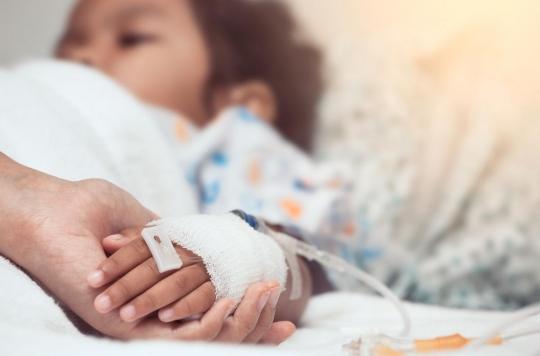Pediatric cancer care has been affected in more than three-quarters of hospitals worldwide by the health crisis. One in ten hospitals even had to close its pediatric oncology department.

- More than a third of children with one (34%) dropped out of treatment.
- Hospitals diagnosed almost one in two less cancers than expected (43%) and almost one in ten establishments (7%) completely closed their pediatric cancer unit at some point during the pandemic.
- Most hospitals have since adapted and implemented new means of communication and new methods for better management of pediatric cancers.
In turn, the health effort to meet the needs of the Covid-19 pandemic has a negative effect on pediatric cancer care. A survey of more than 300 clinicians in more than 200 hospitals around the world reveals that more than three-quarters (78%) reported effects of the pandemic on their ability to provide care for children with cancer. This study, the first on the subject, was published on Wednesday March 3 in the journal The Lancet Child & Adolescent Health.
Pediatric services closed
The health crisis has not spared sick children: less diagnosis, interruption of treatment, closure of pediatric oncology services…. “Our results suggest that the Covid-19 pandemic has had a greater impact on pediatric cancer care globally than studies focused on a single region would suggest.”, noted Daniel Moreira, one of the authors of this study, who works at St Jude Children’s Research Hospital, an American institution specializing in pediatric diseases. Centers in low- and middle-income countries are the most affected by this phenomenon. In total, the authors interviewed 311 health professionals working in 213 establishments in 79 countries between June 22 and August 21.
The results showed that almost half (43%) of respondents said they had diagnosed fewer cases than expected while a third (34%) reported an increase in the number of patients who dropped out of treatment, i.e. not starting not to take it either four weeks late or more. More serious, the survey found that almost one in ten hospitals (7%) closed their pediatric cancer unit completely at some point during the pandemic, with an average closure of 10 days. Direct consequence: the number of surgeries has been drastically reduced (79%). Disruption to radiotherapy was also considerable, with almost a third (28%) reporting interruption of treatment.
Many shortages
Hospitals also noted that their resources were significantly depleted during this time. A third (32%) saw a decrease in financial support and two-thirds (66%) reported a reduction in available clinical staff. Regarding the beds reserved for children with cancer, one hospital in five (19%) observed a reduction in its reception capacity. The people surveyed also indicated that they had noticed new shortages, whether in blood products (60%) or in treatments that led to changes in chemotherapy (57%). Access to life-saving interventions has been reduced for all hospitals, ranging from a 3% reduction for those with high incomes to 33% for those with lower incomes. Unexpected deaths have, at the same time, increased, up to a 36% increase for the poorest.
After a period of adaptation, most hospitals have implemented new policies and guidelines to support pediatric cancer care during the pandemic. More than two-thirds (69%) are using new or adapted patient and staff safety checklists, the researchers add. New communication processes with patients and families and new guidance on essential services have also been integrated. “Although the Covid pandemic has created new obstacles for childhood cancer care, we have shown that we are a resilient community and that we can use some adaptations imposed by the pandemic in the future.”, assured Professor Laila Hessensen, of the Mohammed V University of Rabat in Morocco, quoted in a press release from the scientific journal.
.















